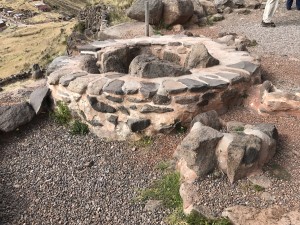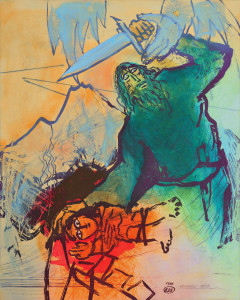I knew that the Inca practiced human sacrifice. What I didn’t know prior to our recent trip to Peru was that their sacrifices were of children. And not just any children, but the most beautiful children from well-born families.
The ceremony was called capacocha, “solemn sacrifice”. Parents offered what they most prized – their children – to the mountain gods to ensure water for the harvest and protection against earthquakes, volcanic eruptions, and other natural phenomena. The children were brought to the palace in Cusco (the principal city of the Inca empire) and treated like royalty over the course of a year or two.
 As part of the capacocha ceremony, children were sacrificed in pairs, a girl and a boy together. The children were dressed in fine clothes and adorned with jewelry. A feast was held in their honor. The children were then brought up to the top of the mountain in a long procession accompanied by priests and Inca chiefs as well as their parents. Once there, the children were left on the mountain. The most common means of death was a blow to the back of the head to render the child unconscious (although some children were already rendered unconscious from consumption of liquor and coca) and being left to die. The priests would later return to construct a huaca (burial chamber) which would be filled with food and objects for the next world.
As part of the capacocha ceremony, children were sacrificed in pairs, a girl and a boy together. The children were dressed in fine clothes and adorned with jewelry. A feast was held in their honor. The children were then brought up to the top of the mountain in a long procession accompanied by priests and Inca chiefs as well as their parents. Once there, the children were left on the mountain. The most common means of death was a blow to the back of the head to render the child unconscious (although some children were already rendered unconscious from consumption of liquor and coca) and being left to die. The priests would later return to construct a huaca (burial chamber) which would be filled with food and objects for the next world.
The thought of sacrificing a child is horrible. What kind of society would demand this? How could a parent go along with this?
Which brings me to that most troubling part of our Torah – the Aqedah (binding of Isaac) – that we read on Rosh Hashanah. Abraham takes Isaac up Mount Moriah. He doesn’t plan to leave Isaac there to die. He brings a knife for ritual slaughter and wood for the burnt offering – he will actively carry out the sacrifice himself.
Sacrifice involves the giving up of something of great value for the sake of something else deemed to have greater value or claim. Abraham is forging a relationship with God – something of such value that he would give up this most prized child whom he had waited so long for and who is apparently the key to the fulfillment of God’s promise (Look towards heaven and count the stars …so shall your offspring be, Gen 15:5). It is perhaps understandable that Abraham would consider sacrificing his child. Child sacrifice was very common in the ancient world. Abraham came from Ur, where human sacrifice was certainly practiced (I recall reading an article in the NYTimes about this some years ago).
What I find really troubling is why God would tell Abraham to do this. God detests child sacrifice: You shall not act thus towards the Lord your God, for they perform for their gods every abhorrent act that the Lord detests; they even offer up their sons and daughters in fire to their gods (Deut 12:31).
The Torah says that God was testing Abraham (Gen 22:1). What does this mean? One explanation is that God was testing Abraham’s faith (see the commentary on page 117 of our Etz Chaim chumash). I don’t buy this. Abraham’s prior actions have demonstrated his faith and commitment to God: he has already left his home to settle in a new place (Gen 12:1-2), been circumcised (Gen 17:23), and sent his other son Ishmael away (Gen 21:12-14), all at God’s behest.
Rather than testing the fact of Abraham’s faith, God might have been testing the nature of that faith and Abraham’s relationship with God. If so, then Abraham failed the test. Not too long before, Abraham had argued with God about God’s decision to obliterate Sodom and Gemorrah (Gen 18: 23-32). This did not anger God. Rather, God “was mindful of Abraham” (Gen 19:29). I imagine God reveling in this give-and-take relationship with Abraham and deciding to do something to provoke another such exchange. And I imagine God’s deep dismay that Abraham could have so misunderstood and feared God that he would think God would want such a sacrifice and require blind obedience.
So why didn’t God intervene sooner? God could have stopped Abraham at any time and told him to sacrifice an animal. But would this have been sufficient? If Abraham believed that child sacrifice was acceptable, what would have prevented him from deciding on his own to offer such a sacrifice at another time? So God lets Abraham get to the brink of killing his own son. And only then does God stop Abraham, sadly acknowledging the fear that had led Abraham to take that action: (Do not raise your hand against the boy or do anything to him. For now I know that you fear God since you have not withheld your son, your favored one, from Me, Gen 22:12). Abraham’s eyes are opened (he raised his eyes and saw, Gen 22:13) It is at this point that Abraham sees a ram and offers that as a sacrifice instead.
Or perhaps this was not a lesson for Abraham. Maybe this was a lesson for Isaac. The Torah doesn’t tell us much about Isaac to this point but there seems to be a concern about keeping Isaac from outside influences. (See, for instance the commentary about page 114 of Etz Chaim about sending Ishmael away). Perhaps this was God’s way of ensuring that Isaac, having experienced the other side of sacrifice and regardless of what his father accepted, would never himself think of offering such a sacrifice to God.
I could find no mention prior to these events about a relationship between Isaac and God. Through the Aqedah, Isaac experiences first hand God’s caring and protection. Subsequently Isaac turns to God to plead for Rebekah to have a child (Gen 25: 9) and trusts God to provide when there is a famine in the land (Gen 26: 1-6). A separate and different relationship is established between Isaac and God, one built on love rather than fear.
- Shabbat in Uzbekistan - Wed, Apr 17, 2024
- Purim in Uzbekistan - Thu, Apr 4, 2024
- Quick-ish Soups - Thu, Feb 22, 2024



Christians believe that this was a beautiful foreshadowing of the kind of sacrifice that would eventually be required for all of mankind. It was a revelation given to Abraham that directly pointed to the Kind of Sacrifice (and faith) that would ultimately save humanity. The binding of Issac a prototype of Fatherly Sacrifice which fulfills covenant promise. Christians view this story as being triumphantly fulfilled in the Sacrifice of Christ.